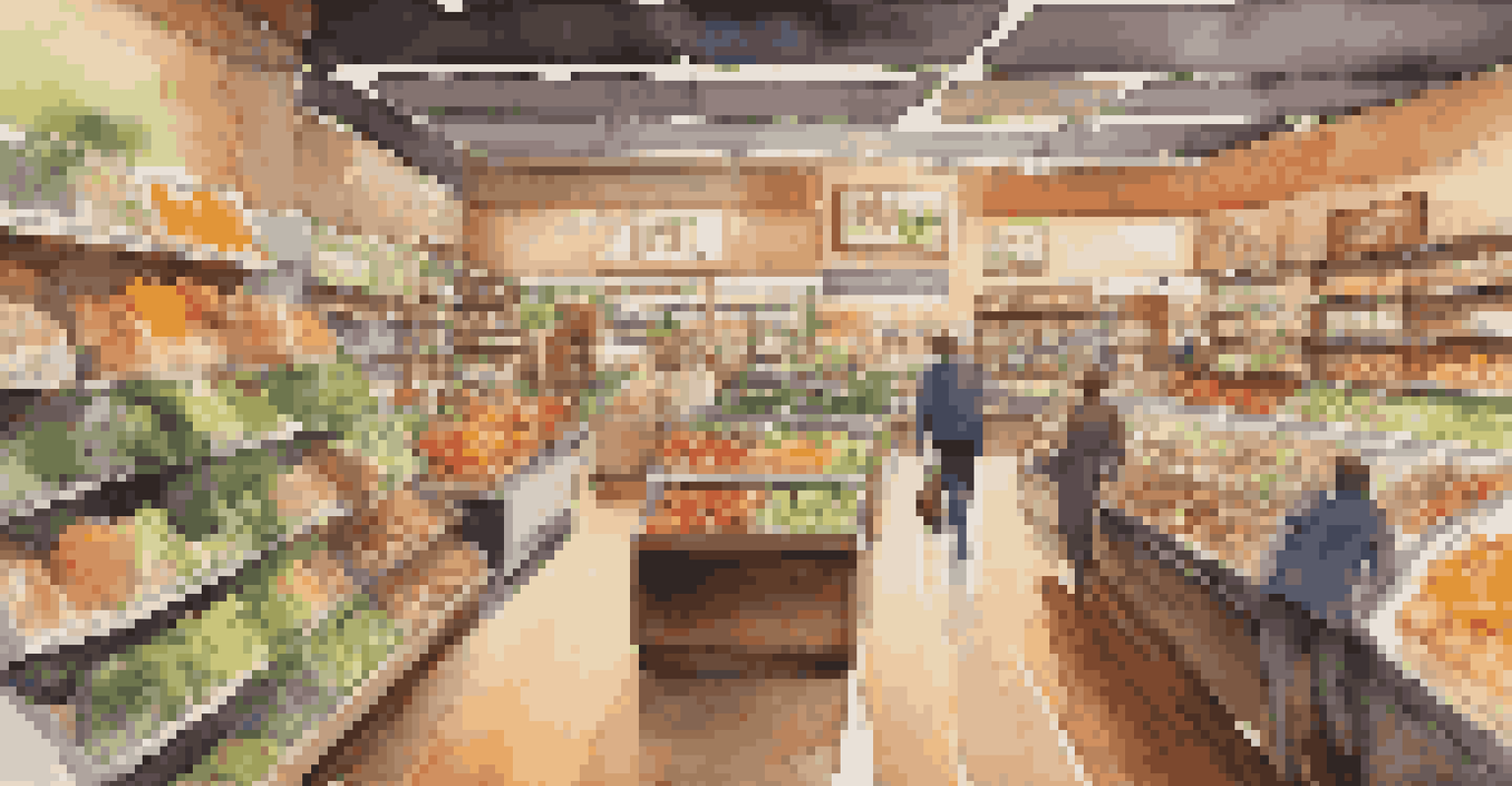How Proximity to Grocery Stores Influences Home Values

Understanding Home Values and Grocery Store Locations
Home values are influenced by a variety of factors, and one of the most significant is proximity to grocery stores. When looking for a new place to live, many buyers prioritize convenience, and easy access to everyday necessities plays a big role in their decisions. Properties near grocery stores often attract more attention, leading to higher demand and, consequently, higher prices.
Location, location, location is the mantra of real estate, and it’s a reminder that the proximity to essential services like grocery stores can significantly affect home values.
The convenience of having a grocery store nearby means less time spent on errands and more time for family or leisure activities. This aspect is especially appealing to busy families or individuals who value efficiency in their daily routines. Additionally, the presence of grocery stores can enhance the overall livability of a neighborhood, making it a more attractive option for potential buyers.
Moreover, neighborhoods with diverse grocery options—such as organic markets, ethnic grocers, or large supermarkets—tend to appeal to a broader range of buyers. This variety can positively affect home values, as it signals a vibrant community with amenities that cater to different tastes and preferences.
The Role of Grocery Stores in Neighborhood Appeal
Grocery stores contribute significantly to the appeal of a neighborhood. They act as community hubs, where residents can gather, socialize, and connect with their neighbors. This sense of community often translates into a greater desire to live in that area, which can drive up home values.

Additionally, neighborhoods with well-maintained grocery stores often reflect a higher overall quality of life. Buyers are likely to perceive these areas as safer and more desirable, impacting their willingness to pay a premium for homes nearby. A grocery store's reputation—whether it’s known for fresh produce or excellent customer service—can also enhance the perceived value of the surrounding homes.
Grocery Stores Boost Home Values
Proximity to grocery stores significantly increases home demand and prices, as buyers prioritize convenience.
Furthermore, the presence of grocery stores can stimulate local businesses, creating a thriving economic environment. When a neighborhood is bustling with activity, it can create a positive feedback loop where increased foot traffic leads to further development and, in turn, higher home values.
How Grocery Store Accessibility Impacts Buyer Decisions
Accessibility to grocery stores plays a crucial role in shaping buyer preferences. Many potential homeowners prioritize convenience, and the closer a property is to a grocery store, the more appealing it becomes. This trend is particularly pronounced among first-time buyers and those with busy lifestyles who seek hassle-free living.
A thriving community often reflects its grocery stores—places where neighbors connect and commerce flourishes, ultimately driving up property values.
Buyers often consider the distance to grocery stores as part of their overall evaluation of a neighborhood. If a home is situated far from essential amenities, it may be viewed as less desirable, leading to a decrease in its market value. Essentially, the ease of running errands can significantly influence buyers' willingness to commit to a property.
Moreover, in today's fast-paced environment, many people prefer walkable neighborhoods where they can easily access grocery stores and other amenities. This trend has given rise to the popularity of urban living, where convenience is king, and homes within walking distance to grocery stores tend to maintain higher values.
The Impact of Grocery Store Types on Home Values
Not all grocery stores are created equal when it comes to influencing home values. The type of grocery store nearby can significantly impact how buyers perceive a neighborhood. For instance, upscale grocery stores or specialty markets may enhance property values more than a standard supermarket due to their association with higher-quality goods and an affluent clientele.
Conversely, if a neighborhood is home to discount or low-quality grocery stores, it may deter potential buyers. The perception of quality associated with grocery options can reflect broader sentiments about the neighborhood itself, influencing both demand and property values.
Community Appeal Enhances Value
Grocery stores serve as community hubs, enhancing neighborhood appeal and contributing to higher property values.
Therefore, real estate agents often emphasize the type of grocery stores available when marketing homes. Highlighting proximity to popular or high-end grocery options can be a strategic move that enhances perceived value and attracts eager buyers.
Urban vs. Suburban Grocery Store Influence on Home Prices
The influence of grocery store proximity on home values can vary significantly between urban and suburban areas. In urban settings, grocery stores are often more densely located, making them a cornerstone of neighborhood dynamics. Homes in these areas may experience a more pronounced bump in value due to the convenience of multiple grocery options within walking distance.
In contrast, suburban areas may have fewer grocery stores, but their presence can be just as impactful. A well-placed grocery store in a suburban neighborhood can become a major selling point, especially for families who value community and convenience. In these areas, the distance to the nearest store can be a deal-breaker for many buyers.
Ultimately, whether in urban or suburban settings, the availability and type of grocery stores can significantly shape housing markets. Buyers often weigh their lifestyle preferences when deciding on a location, leading to differing impacts on home values based on grocery store accessibility.
Grocery Store Development and Its Effect on Real Estate Markets
The development of new grocery stores can substantially impact local real estate markets. When a new store opens in an area, it can lead to an uptick in home values as buyers recognize the added convenience and amenities. This phenomenon often leads to increased activity in the housing market, with homeowners and investors keen to capitalize on the potential appreciation.
Moreover, the construction of grocery stores typically signals growth and investment in a neighborhood. Such developments often attract other businesses and services, contributing to overall economic revitalization. As the area becomes more desirable, home values are likely to rise, creating a positive cycle of development.
Store Types Influence Buyer Perception
The type of grocery store nearby can greatly affect how buyers perceive a neighborhood and thus impact home values.
However, it’s essential to consider that not all grocery developments lead to positive outcomes. If a new store competes with existing businesses or fails to meet community needs, it may not have the desired effect on home values. Understanding this dynamic is crucial for buyers, sellers, and investors alike.
Future Trends: Grocery Store Proximity and Home Value Evolution
As urban planning and consumer preferences evolve, the relationship between grocery store proximity and home values is also changing. With the rise of online grocery shopping, some buyers may prioritize proximity less than they did in the past. However, many still value convenience, especially for last-minute purchases and fresh produce.
Trends like sustainable living are also shaping how grocery stores influence home values. Neighborhoods with access to local farmers' markets or health-focused stores may see increased demand, as buyers seek out communities aligned with their values. This shift could lead to the emergence of new patterns in how proximity to grocery stores affects property values.

Ultimately, the future will likely see a blend of traditional grocery shopping and innovative solutions. As communities adapt to changing lifestyles, the influence of grocery store proximity on home values will continue to evolve, reflecting the needs and desires of modern homeowners.